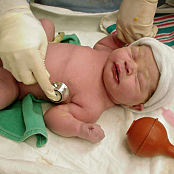If you're considering a nursing career, you may be thinking about a traditional nursing path within an inpatient setting, but many more options are available. One of the greatest advantages of nursing is the abundance of choices and specialized areas that are offered.
Facility Nursing
You'll likely begin your nursing career in an inpatient unit, such as a hospital or nursing home, but your options for treating patients in a facility setting go beyond just these two traditional sources. You may also consider working in schools, doctors' offices or correctional facilities. The first two offer traditional working hours without weekends or holiday work. Correctional nursing jobs often come with incentives because this specialization is often overlooked. Many correctional nurses have expressed surprise over the fewer stresses in comparison to hospital or long term care jobs.
Caring for Patients at Home
While U.S. Bureau of Labor Statistics (BLS) notes that home health nurses average $6,000 less per year in salary nationally than hospital nurses, you'll enjoy the flexibility of creating your own schedule and working outside of an office or clinic. Of course, home health nurses also need to adapt their schedule when there are unexpected changes in patients' needs, which may necessitate working past normal work hours. But you'll get the opportunity to spend quality time with your patients within this role.
You might also consider signing with an agency that specializes in private duty staffing. These cases often involve caring for ventilator patients in their homes, but a handful of agencies specialize in private duty nursing.
Administrative Nurses
The BLS reports that 72 percent of nurses work in home health, doctors' offices or a traditional inpatient setting, which leaves 28 percent in nontraditional nursing roles. Sometimes nurses seek a more office oriented position, such as insurance case management, where medical claims are reviewed for approval. Another specialty to consider is working as a minimum data set (MDS) nurse in long term care. In this role, you prepare the facility's reimbursement paperwork for Medicare and insurance companies. MDS nurses are in great demand, and rarely work weekends or holidays unless they are required to be part of administrative on-call duties.
For those with advanced degrees, consider teaching nursing in a college or technical school setting. RNs with many years of experience can work as facility nurse educators, and run educational programs in hospitals.
Work at Home
A new option offered is a work at home nursing position. Many insurance companies now offer nurse advice lines, either staffed in-house, or through new agencies that field phone calls for multiple nurse lines. You'll often start out in an office setting, but once you have been trained, you can transition to working at home.
Another work from home option involves telephonic triage, in which you field calls after hours for doctors' offices or home health and hospice agencies. You'll be expected to try to handle the situation via phone first, then notify an on-call nurse to make a visit if needed. Hours are typically evenings, nights and weekends, but the option to work in comfortable clothes and eliminate a commute to work provide a tempting incentive.
With so much diversity in job offerings, you'll always have new options to pursue in nursing if you begin to feel burned out or are seeking a change.
Photo Source: Morguefile
[cf]skyword_tracking_tag[/cf]


